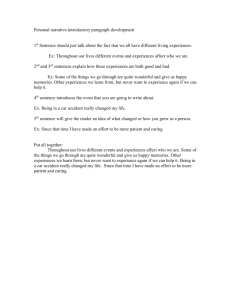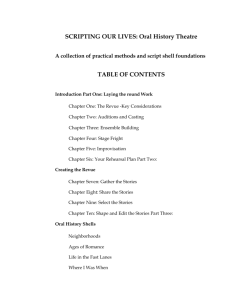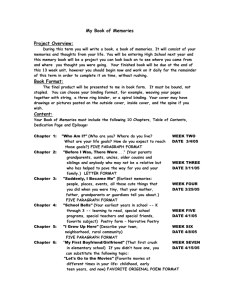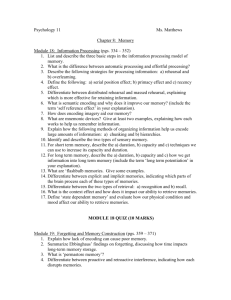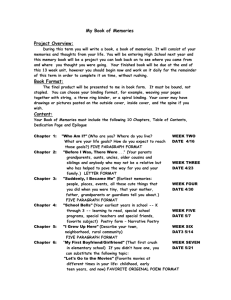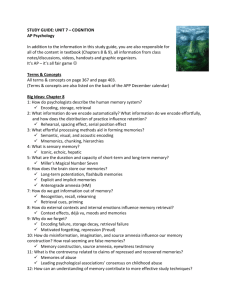Do our experiences shape who we are? Are the
advertisement
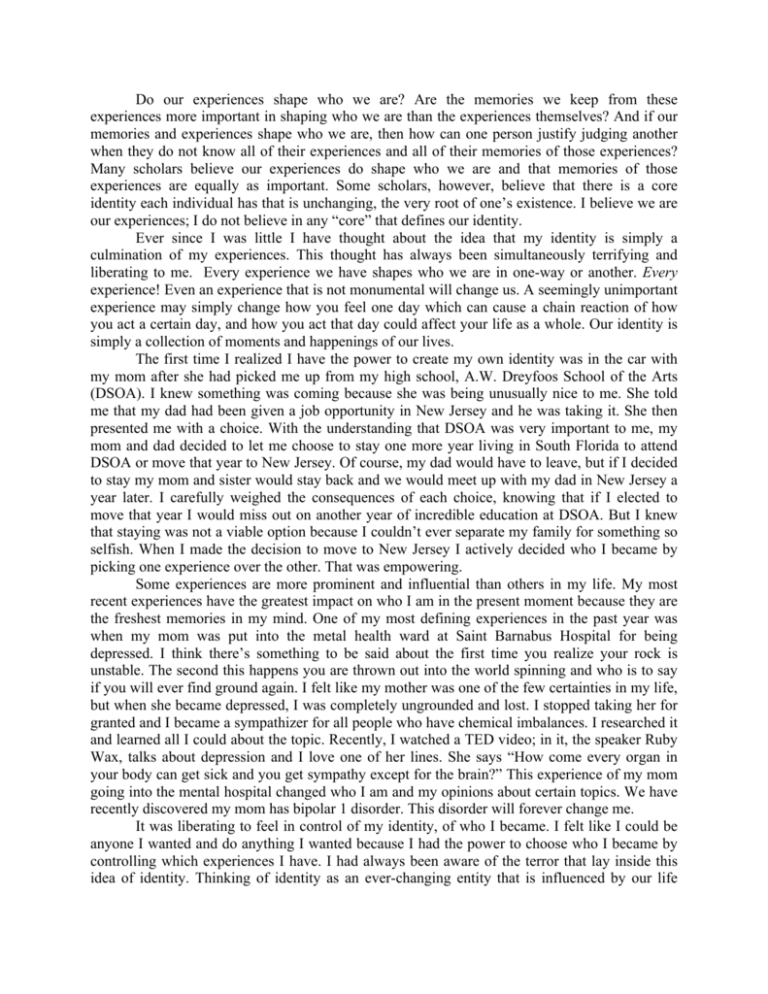
Do our experiences shape who we are? Are the memories we keep from these experiences more important in shaping who we are than the experiences themselves? And if our memories and experiences shape who we are, then how can one person justify judging another when they do not know all of their experiences and all of their memories of those experiences? Many scholars believe our experiences do shape who we are and that memories of those experiences are equally as important. Some scholars, however, believe that there is a core identity each individual has that is unchanging, the very root of one’s existence. I believe we are our experiences; I do not believe in any “core” that defines our identity. Ever since I was little I have thought about the idea that my identity is simply a culmination of my experiences. This thought has always been simultaneously terrifying and liberating to me. Every experience we have shapes who we are in one-way or another. Every experience! Even an experience that is not monumental will change us. A seemingly unimportant experience may simply change how you feel one day which can cause a chain reaction of how you act a certain day, and how you act that day could affect your life as a whole. Our identity is simply a collection of moments and happenings of our lives. The first time I realized I have the power to create my own identity was in the car with my mom after she had picked me up from my high school, A.W. Dreyfoos School of the Arts (DSOA). I knew something was coming because she was being unusually nice to me. She told me that my dad had been given a job opportunity in New Jersey and he was taking it. She then presented me with a choice. With the understanding that DSOA was very important to me, my mom and dad decided to let me choose to stay one more year living in South Florida to attend DSOA or move that year to New Jersey. Of course, my dad would have to leave, but if I decided to stay my mom and sister would stay back and we would meet up with my dad in New Jersey a year later. I carefully weighed the consequences of each choice, knowing that if I elected to move that year I would miss out on another year of incredible education at DSOA. But I knew that staying was not a viable option because I couldn’t ever separate my family for something so selfish. When I made the decision to move to New Jersey I actively decided who I became by picking one experience over the other. That was empowering. Some experiences are more prominent and influential than others in my life. My most recent experiences have the greatest impact on who I am in the present moment because they are the freshest memories in my mind. One of my most defining experiences in the past year was when my mom was put into the metal health ward at Saint Barnabus Hospital for being depressed. I think there’s something to be said about the first time you realize your rock is unstable. The second this happens you are thrown out into the world spinning and who is to say if you will ever find ground again. I felt like my mother was one of the few certainties in my life, but when she became depressed, I was completely ungrounded and lost. I stopped taking her for granted and I became a sympathizer for all people who have chemical imbalances. I researched it and learned all I could about the topic. Recently, I watched a TED video; in it, the speaker Ruby Wax, talks about depression and I love one of her lines. She says “How come every organ in your body can get sick and you get sympathy except for the brain?” This experience of my mom going into the mental hospital changed who I am and my opinions about certain topics. We have recently discovered my mom has bipolar 1 disorder. This disorder will forever change me. It was liberating to feel in control of my identity, of who I became. I felt like I could be anyone I wanted and do anything I wanted because I had the power to choose who I became by controlling which experiences I have. I had always been aware of the terror that lay inside this idea of identity. Thinking of identity as an ever-changing entity that is influenced by our life experiences has its pros, but the cons can be terrifying. It’s the idea that we are not always in control of what we experience, and since who we are is based upon our experiences, we are not completely in control of our identity. The terror aspect comes from the understanding that lifechanging decisions are not always ours to make. When I was a little kid I was obsessed with imagining what my life would be like if my family had stayed in one place. I constantly created scenarios in my head of how life would be if I had grown up in Clearwater, FL, my first home. As a child I was consumed with the idealism of these different identities. I fantasized about who I would be if these scenarios were reality. They started as very silly imaginations of who I would be—like the head cheerleader or the lead role in the school drama—but as I have aged, these ideas have become more developed. I find myself thinking about who I would be if I hadn’t auditioned for Bak Middle School of the Arts. Would art have found me anyway? Or would I be on my original path to be an astronaut or marine biologist? If I had lived my entire life from birth in Clearwater, FL I never would have attended Bak MSOA or DSOA and I, most likely, would not be studying at Oxbow. Every experience we have shapes who we are in one-way or another. Every experience! Even an experience that is not monumental will change us. A seemingly unimportant experience may simply change how you feel one day which can cause a chain reaction of how you act a certain day, and how you act that day could affect your life as a whole. Our identity is simply a collection of experiences. However, identity is not a core self that has in its possession a collection of experiences. There isn’t a core identity for each person; identity is simply defined by our collection of experiences. We are all simply collections of our experiences, and naturally those collections are all unique and different, so there is no universal truth or set of morals. There can’t be. With no universal truth and no universal set of morals nobody can justify judging anyone else because they simply don’t know all of that person’s collection! There’s a common belief that many people do not question identity. The belief is that there is a core “you” and as you explore life, you acquire memories, beliefs, and experiences. These memories, experiences, and beliefs are a part of who you are, but just a part; this core “you” has all of these parts. This idea gives people an excuse for who they are and who they become, which is where we run into trouble. The idea of core-identity came from 17th century philosopher Plato who believed, “What I essentially am is a simple, immaterial soul.” This was the beginning of core-identity. The philosopher Locke was one of the first to challenge this idea of self. Locke believed a person should take ownership of their actions and, because of this belief, Locke started to connect personal identity to moral responsibility, which is what I aim to do when I ask the question, “If we are a culmination of our experiences and memories, how can we justify judging others without knowing all of their experiences and memories?” Now, not everyone was on board with Locke’s idea of identity. Joseph Butler questioned Locke because Butler still believed in Plato’s substance-based identity. Butler thought Locke had made a “wonderful mistake.” Butler says, “While memory can reveal my identity with some past experience, it does not make that experience me.” Butler insists, “What I am remembering are the experiences of a substance, namely, the substance that constitutes me now.” So, Butler and Plato believe in this core self, while Locke is left a lone-ranger believing that our identity is made up by our experiences and memories. Locke and Reid challenged Locke by asking how can identity that they feel is unchanging be built by experiences and memories that are forever changing. Both Butler and Reid rejected Locke’s view of identity for a substance-based view of identity. I believe Butler and Reid have many holes in their argument against Locke’s view of identity. For example, Butler and Reid challenged Locke’s view of identity by arguing that identity persists through the loss of memory and they found it hard to believe that they would cease to exist if they were to undergo amnesia. This seems like a plausible argument; however, one may have a direct memory of some past self that itself had direct memories of an earlier self, and so on, until every self in the life is linked by a chain of overlapping direct memories. This works only if we assume that the memories have only faded and not completely left us. But what if the memories are completely gone; do we cease to exist then? No, even then Locke’s theory stays strong because those memories and experiences that we had left us with beliefs, desires, goals, and intentions, and even when we lose memory of experiences we are left with what those experiences provided for us. We are left with beliefs, goals, intentions and desires; we may not remember where we got them, but we have them and this avoids the objections of Reid and Butler and leaves Locke’s theory strong. Another theory that counteracts Reid and Butler’s argument is an idea raised by Chad A. and Robert C. of NPR’s Radiolab. They argue that the safest, most honest memories are memories in the minds of people who can’t remember. So, perhaps when you lose your memory you are more you than you ever have been. Robert C. also agrees with the theory that we are memories and experiences. He says, “Really what I am is a string of memories, that’s the closest way of describing the real me as I can find. I own those memories and they define me.” A philosopher Julian Baggini believes in this theory also and says, “It’s a shift from thinking of yourself as a thing that has all of the experiences of life to thinking of yourself as simply that collection of all experiences in life.” He also uses a metaphor that I think explains this theory perfectly. Think of a watch. A watch has parts—the chain, the face, the hands—and those parts make up the watch, but there is no core essence of the watch that has these parts. The watch is simply a collection of these parts. Baggini says, “We are a process. It’s fluid. It’s forever changing.” Twentieth century philosopher Jean Paul Sartre believes identity of self is something along these same lines. He believes we are not a self but a presence-to-self. In saying this, Sartre is arguing against the Plato-Butler-Reid belief that there is a core identity in all of us. He is arguing that there is no such thing as a core. Sartre says, “Freedom is the definition of man” and we know that with freedom comes responsibility. This ties back into what I said earlier. The idea that there is no core identity leaves us all responsible for who we are and who we become. As Sartre says, “We are responsible for our ‘world’ as the horizon of meaning in which we operate and thus for everything in it insofar as their meaning and value are assigned by virtue of our lifeorienting fundamental ‘choice.’” Sartre believes that the fundamental “choice” is the basis of which our subsequent choices are made. This is the same idea I have and this is why it was such a liberating moment for me when I was able to choose whether we moved to New Jersey that year or not. I was choosing my own experiences and I knew this decision would affect all decisions I made afterwards and all experiences I would have afterwards; and by extension, this decision would forever change my identity and who I would become. The ability to take control of our own identity and life is a powerful thing that should not be ignored because of the idea that we have a core identity that is unchanging. That idea is completely ludicrous to me. The idea that we have a core self feels like an excuse to use for our actions. To me, it feels like something you say to excuse who you are, how you act, and the decisions you make. I think it’s important that we think of ourselves as something we can shape and change. Daniel Kahneman, a modern day philosopher, believes that experience and memory both shape who we are in different ways. He believes there is an “experiencing self who lives in the present and knows the present” and that there is a “remembering self that keeps score and maintains the story of our life.” I agree with this philosophy. Overall, he says, “What we get to keep from our experiences is a story.” This idea is what ties experience to memory and vice versa. Experiences and memories are both equally important in shaping who we are. Now there’s the issue of comparing ourselves to others and judging others’ decisions. If we are a culmination of all of our experiences and memories; and if, as Sartre puts it, fundamental choice is the grounds for our subsequent choices, then it is not justifiable to judge someone else or compare yourself to someone else. Everyone else has a totally unique collection of memories and experiences that make them act in certain ways. We all learn different things from our different experiences and we all have reasons for those things. This philosophy goes along with the famous quote: “Never judge a person until you’ve walked a mile in their shoes.” You can’t judge someone because you don’t know all of his or her memories and experiences. I feel very strongly that this is true because I know that I have made uninformed judgments about people before knowing any of their background and I have been completely wrong to judge them. We can never fully know a person’s experiences and memories because we can never be in another person’s mind, so judging anyone is unjustifiable. I also know people have judged me without knowing my memories and experiences and it is a horrible feeling. When I moved to New Jersey, I was pegged for someone who was not “me” at all, but everyone thought they knew me because of the way I looked or acted on the first couple days. But they didn’t know me and they couldn’t have known me. Whomever they thought I was, wasn’t the real me. There’s one experience that I keep having repeatedly and that is the experience of moving. I know that moving a lot has changed how I interact with people and how I feel about friendships; it has drastically changed my friendships themselves. I have always been curious about how different I would be if I hadn’t lived in certain places, had certain experiences, and met certain people. I move very often; I have my whole life, so I have met tons of people. I believe that everyone we know, and I mean truly know well, changes us in some way or another. A relationship is an experience after all. This is why relationships are so important. Not only do they teach us about society, they also teach us about ourselves. Without relationships there would be very little self-growth. Overall, I feel very strongly that experiences and memories shape who we are. An experience can lead to a belief, desire, or goal. A memory can leave us with intentions. All of these things make us who we are. All of these things will never be fully lost. Even when we can no longer remember, the memory is still there in the depths of our mind. So, I believe Locke had it right when he had the philosophy that we are a result of all of the experiences and memories we have. You may be wondering why this is so important to write a long paper about. If we have the mindset that we are all in control of who we are and who we become, then we will develop a mindset that is so important in progress. We will start to take responsibility for our actions, rather than blaming our actions on our core unchanging identity. If we all feel this power to change our actions and ourselves there’s no limit to what changes we can make in ourselves, in our communities, and in our world. Bibliography "Amy Cuddy: Your Body Language Shapes Who You Are." TED: Ideas worth Spreading. N.p., n.d. Web. 12 Nov. 2013. <http://www.ted.com/talks/amy_cuddy_your_body_language_shapes_who_you_are.html>. "BLU." BLU. N.p., n.d. Web. 12 Nov. 2013. <http://blublu.org/>. "Daniel Kahneman: The Riddle of Experience vs. Memory." TED: Ideas worth Spreading. N.p., n.d. Web. 12 Nov. 2013. <http://www.ted.com/talks/daniel_kahneman_the_riddle_of_experience_vs_memory.html>. Dennett, Daniel Clement. "Experience." Consciousness Explained. London U.a.: Lane, the Penguin, 1992. N. pag. Print Flynn, Thomas, Flynn,. "Jean-Paul Sartre." Stanford University. Stanford University, 22 Apr. 2004. Web. 13 Nov. 2013. <http://plato.stanford.edu/entries/sartre/>. Grattan, Nikki, and Klea McKenna. "Maja Ruznic." In The Make. N.p., Oct. 2012. Web. 6 Nov. 2013. <http://inthemake.com/maja-ruznic/>. "Hetain Patel: Who Am I? Think Again." TED: Ideas worth Spreading. N.p., n.d. Web. 12 Nov. 2013. <http://www.ted.com/talks/hetain_patel_who_am_i_think_again.html>. "Julian Baggini: Is There a Real You?" TED: Ideas worth Spreading. N.p., n.d. Web. 12 Nov. 2013. <http://www.ted.com/talks/julian_baggini_is_there_a_real_you.html>. Mitchell, Stephen A., and Margaret J. Black. Freud and Beyond: A History of Modern Psychoanalytic Thought. New York: Basic, 1995. Print. Pickover, Clifford A. Time: A Traveler's Guide. New York [u.a.: Oxford UP, 1998. Print. "Radiolab." Idea Explorer. N.p., n.d. Web. 12 Nov. 2013. <http://www.radiolab.org/story/91569memory-and-forgetting/>. "Radiolab." Radiolab Podcast Articles. N.p., n.d. Web. 12 Nov. 2013. <http://www.radiolab.org/story/259774-solid-rock/>. Ronnberg, Ami, and Kathleen Martin. The Book of Symbols. Köln: Taschen, 2010. Print. "Ruby Wax: What's so Funny about Mental Illness?" TED: Ideas worth Spreading. N.p., n.d. Web. 12 Nov. 2013. <http://www.ted.com/talks/ruby_wax_what_s_so_funny_about_mental_illness.html>. Shoemaker, David, Shoemaker,. "Personal Identity and Ethics." Stanford University. Stanford University, 20 Dec. 2005. Web. 13 Nov. 2013. <http://plato.stanford.edu/entries/identityethics/>. Simon, Hilda. Color in Reproduction: Theory and Techniques for Artists and Designers. New York: Viking, 1980. Print. "Tabaimo." Art21. N.p., n.d. Web. 12 Nov. 2013. <http://www.art21.org/artists/tabaimo>.
